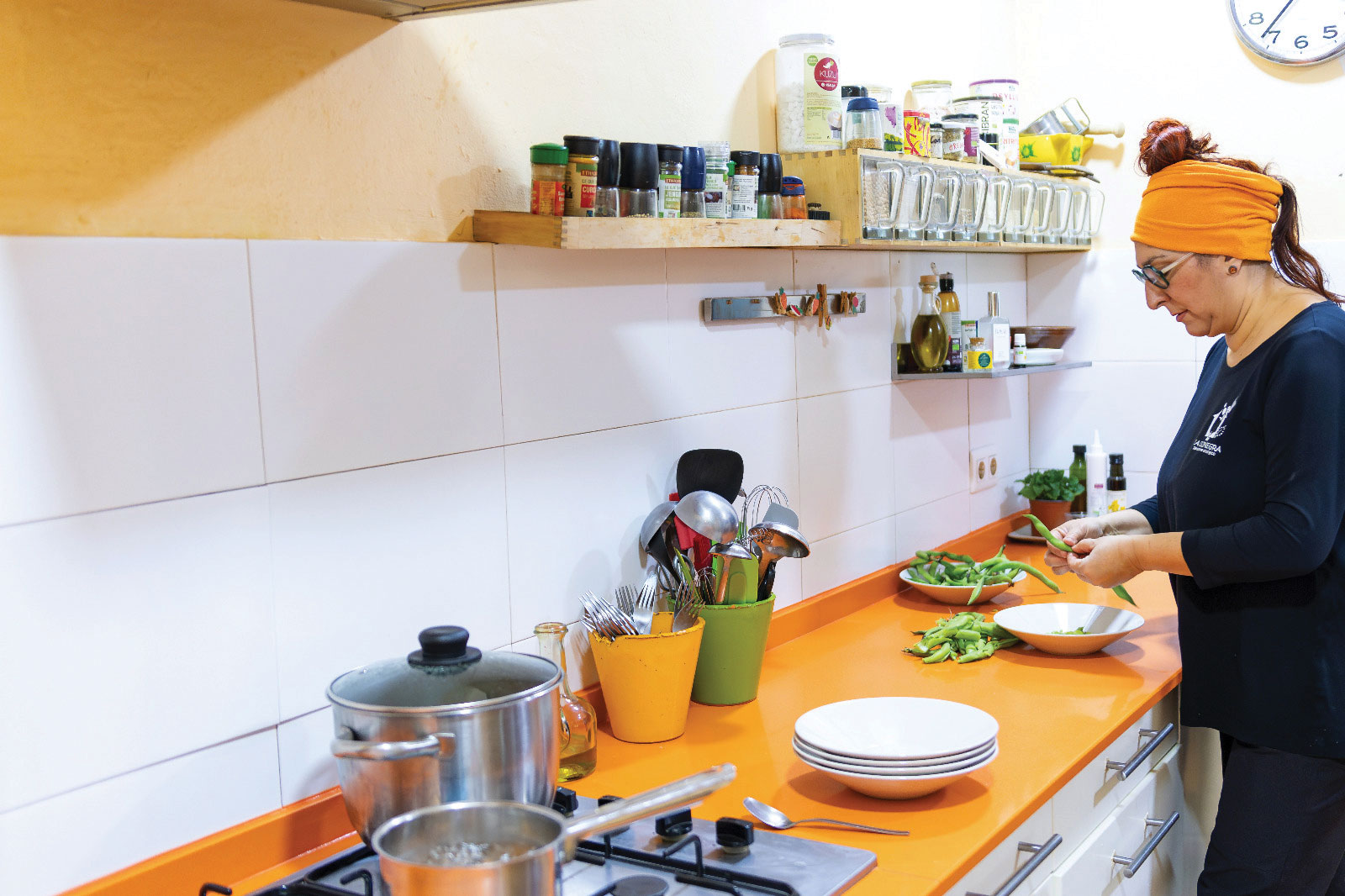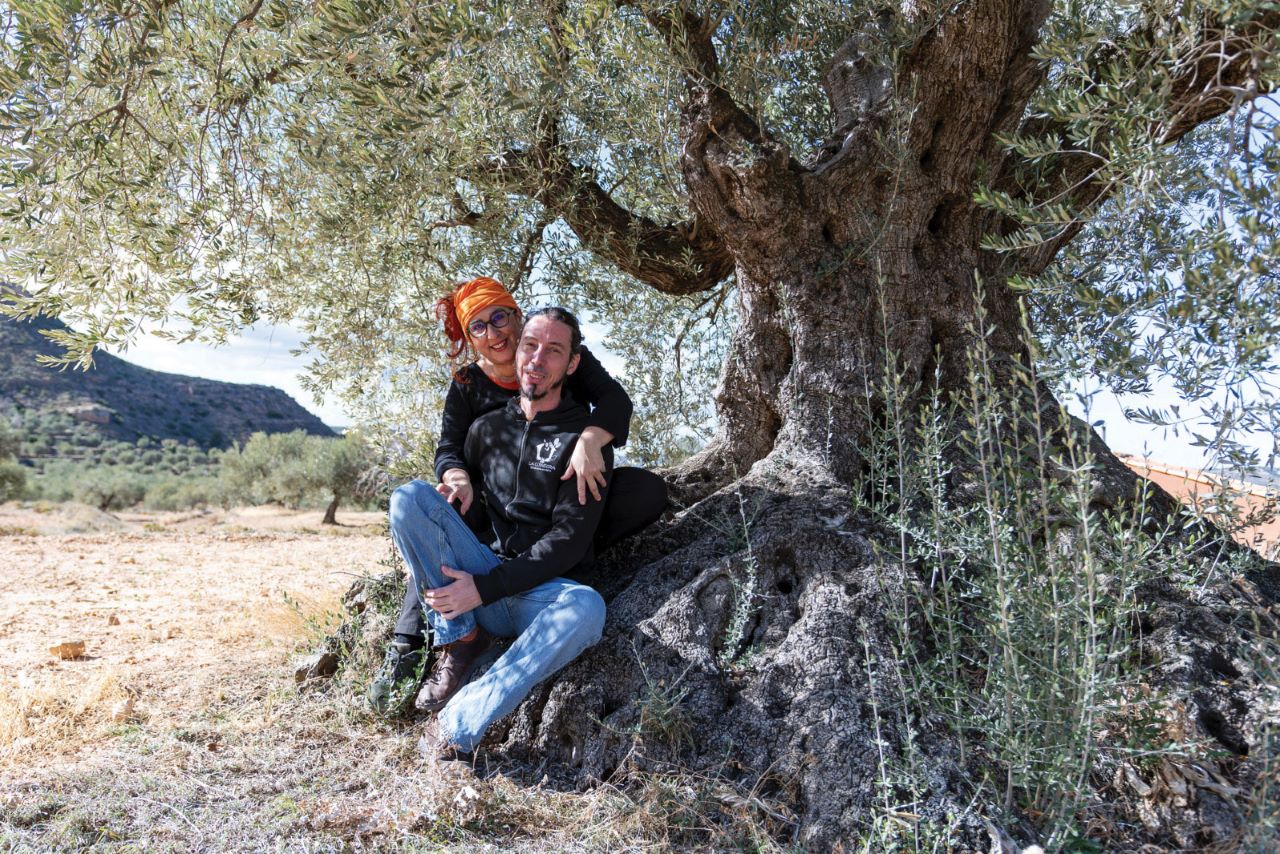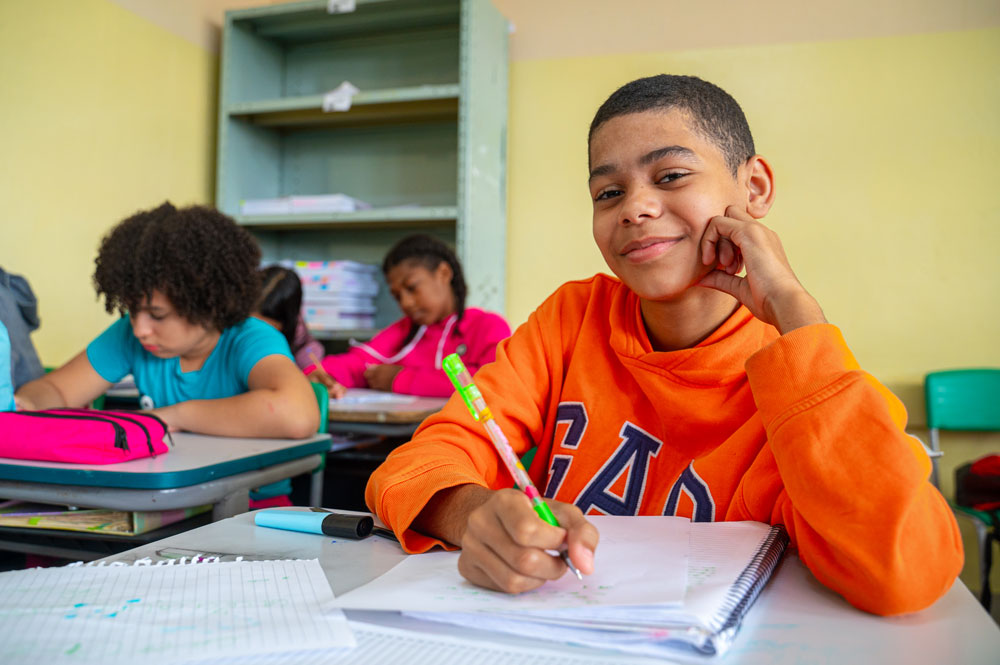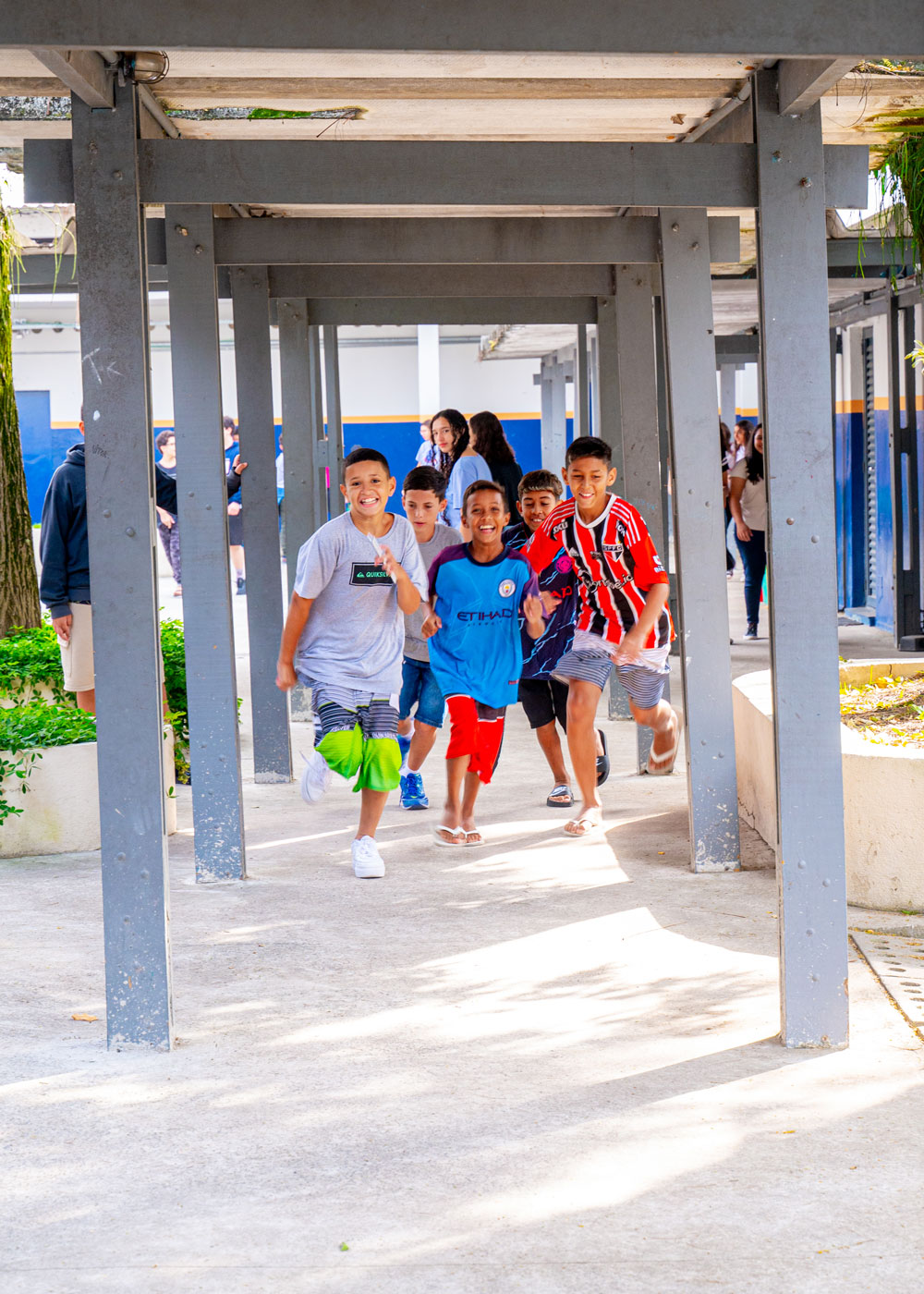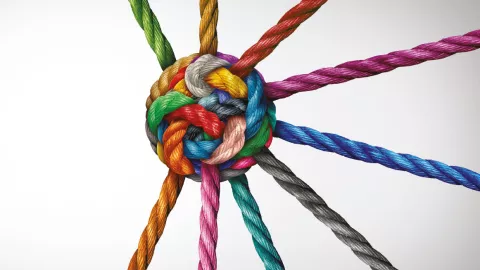The EDP Energia Solidária (Energy Solidarity) program supports social projects that promote a fair energy transition, within areas such as education, agriculture, and community support.
Nature, health, and inclusion
Developed by educational cooperative Cercipeniche, the Ecolive project’s mission is to offer a program of innovative and sustainable therapies and social solidarity that is dedicated to the training and inclusion of people with disabilities, as well as the wider community.
Centered on the concept of Green or Natural Therapy, the Ecolive project aims to promote the full exercise of civil rights, focus on how humans interact with nature, and promote energy efficiency and environmental sustainability. It was supported by the EDP Foundation’s program EDP Energia Solidária, which aims to improve people’s quality of life, promote sustainable practices, and raise awareness in the community about the importance of the relationship between humans and nature.
“The idea for Ecolive came about because of an opportunity created by the EDP Foundation to address key needs that we had identified. For example, the high cost of maintaining spaces such as gardens and swimming pools, the advancing ages of the people supported, and the limited engagement with conventional therapies,” explains João Gomes, from the Ecolive team. So the project was created, dedicated to connecting humans with nature.
Through Ecolive, Green or Natural Therapy will be implemented, focusing on the vegetable garden and therapeutic pool. How? Sustainability will be maximized in the garden with composting, rainwater harvesting, and natural fertilizer. There will also be guaranteed accessibility for people with reduced mobility.
The therapeutic pool will incorporate heating systems, air treatment, LED lighting, and photovoltaic panels, making the therapies more sustainable. “We will have aquatic therapy and physiotherapy activities for babies and adults, among others,” explains João Gomes.
The aim is to have a positive impact on people of all ages, from the very youngest to the elderly. “It should benefit around 30 children, 90 adults, and employees of the educational cooperative Cercipeniche. It will also establish partnerships with local organizations, schools, and groups, totaling more than 300 people,” he says.
The project is based on energy efficiency and environmental sustainability, addressing issues such as climate change, the circular economy, sustainable mobility, and effective water management.
“The support of the Energia Solidária program is crucial. That’s both financially, and through the fundamental support of its volunteers in the application, implementation and development phases, and in future support for project analysis reports.”
Green therapies will promote collective well-being, fostering group activities and intergenerational knowledge sharing. On an individual level it will encourage healthy and sustainable lifestyles, linked to nature and physical activities. It’s an idea that João Gomes hopes will become a regional example of good sustainable practices. “We hope, in the future, to be able to replicate some of the good practices that will be implemented through Ecolive, like the installation of photovoltaic panels.”
This project champions inclusion and well-being, and inspires communities to embrace sustainable practices. Because of this, Cercipeniche is building not just a project, but a legacy of care, innovation, and respect for the environment.
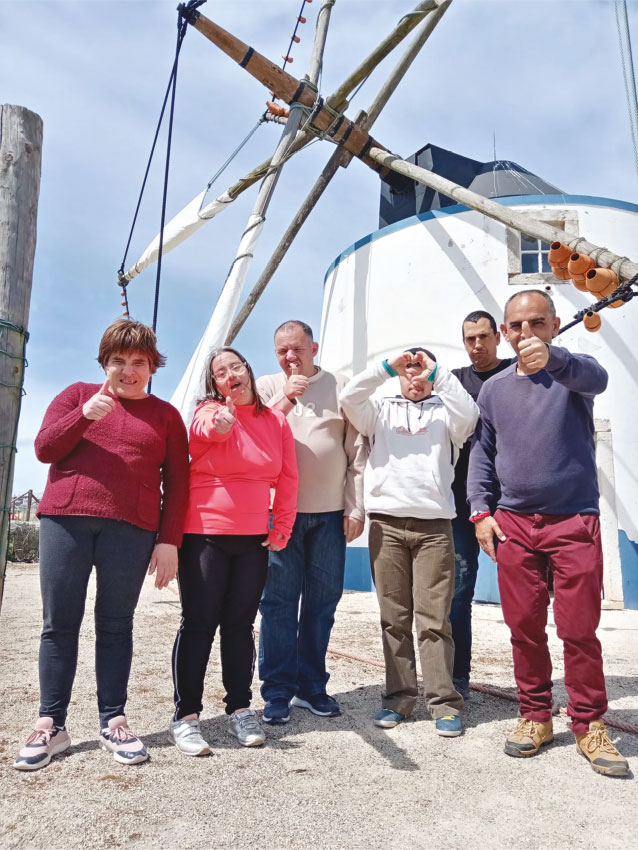
Memories on wheels
A project that combines the excitement of riding an adapted bicycle with the discovery of iconic places in the city of Porto, thus promoting new learning.
In the heart of Porto an innovative project has transformed the way senior citizens and children with special educational needs interact with the city’s historical heritage. Developed by the voluntary organization “Pedalar Sem Idade” (Cycling Without Age), Porto Senior Geocaching combines the excitement of touring an adapted bicycle with the discovery of iconic places in the city known as “Invicta.” It also promotes new, lifelong learning and makes heritage accessible to all. It’s a cycling game in which there is a pilot, a passport, and a tablet with an accessible geocaching application. This helps participants find hidden boxes in the most unexpected places around Porto.
The project originated in Denmark in 2012, and “Cycling Without Age” as it was known there was imported to Portugal in 2018. “Porto was the first location. It took us a year to implement the project and raise funds for the first vehicle,” explains the Porto project’s coordinator Sílvia Freitas. The main challenges were overcoming skepticism and lack of understanding about the project proposal. Also, picking up elderly people from their homes to take them for a bike ride around the city—an activity that many do not associate with this stage of life—required a great deal of effort and organization.
Since its implementation, Porto Senior Geocaching has provided experiences to around 8,000 people in the city. “The objective now is to extend this initiative to more municipalities in the metropolitan area, expanding the reach and impact of this project, which goes beyond a simple bike ride.”
Recently, the project received the significant boost of support from the EDP Energia Solidária program. “This support will make it possible to charge bicycle batteries with energy from a renewable source, increasing the number of vehicles and expanding the cycle routes even further.”
One of the most outstanding stories is that of Isabel, a passenger who always requests longer rides. “On one memorable occasion, I wanted to travel the city from one end to the other. Even when the rider warned that there wasn’t enough charge in the battery, I knew that there were adapted bicycles placed throughout the city. So I said, ‘We’ll ride our bike to that point, and then take another one back.’ And that’s what we did,” she says.
The cyclists, volunteers and real storytellers, carry out the tours to combat social isolation. “We cycle to get the wind in our hair, for the sake of culture and relationships, and to reconnect elderly people and others with their communities,” Sílvia Freitas tells us.
She also wants to take the idea to other cities. “The essence of this project goes beyond providing simple bicycle tours; it’s about creating memories, promoting inclusion, and celebrating the joy of learning and living together, regardless of age.”
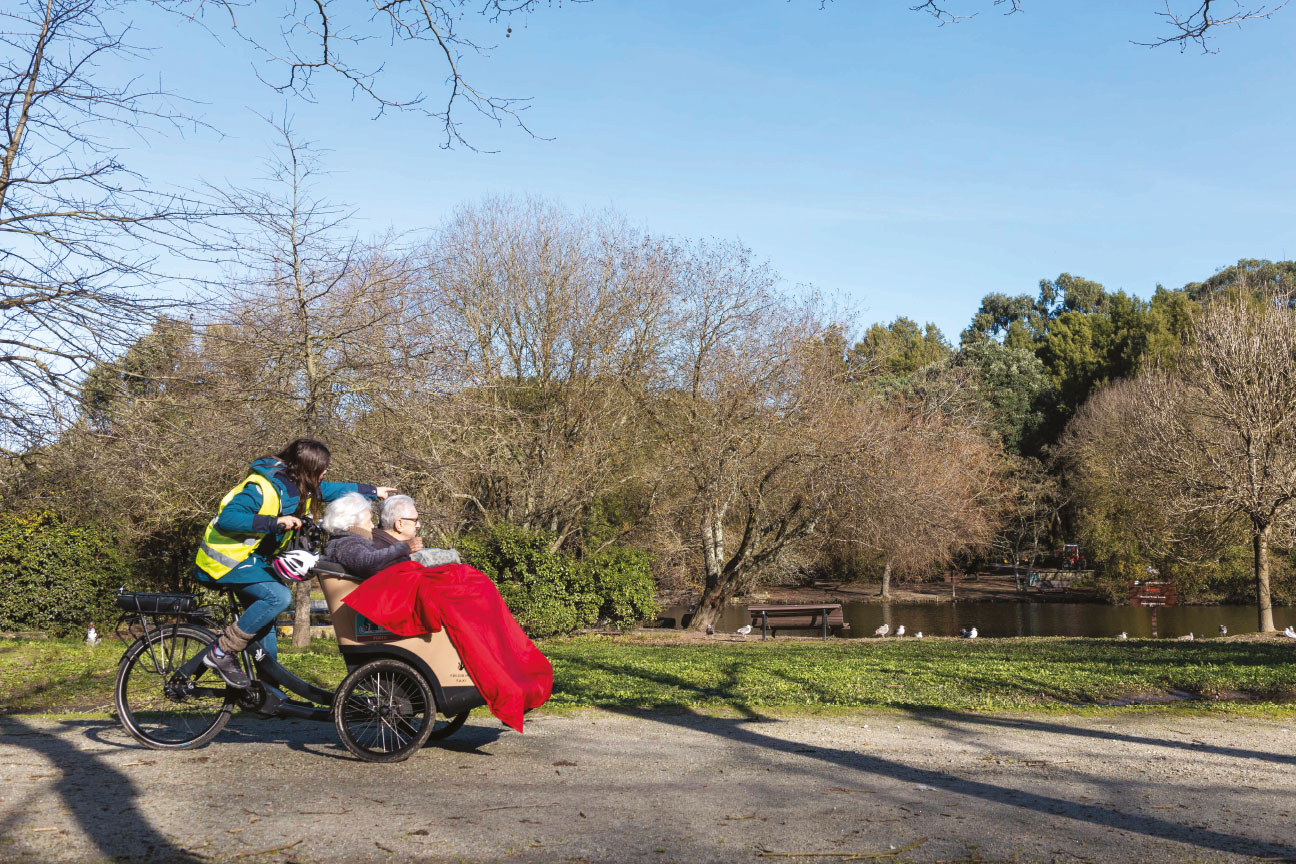
Learning by doing
The #SomosEnergia (WeAre Energy) project aims to develop technical and interpersonal skills in young NEETs (Not in Employment, Education, or Training), empowering them to play an active role in the energy transition of their communities.
Developed by the Sustainable Energy Youth Network (SEYN) Association, in collaboration with the University of Évora and Drive Impact CRL, #SomosEnergia aims to create a culture of change in communities near the Sines and Pego thermoelectric power plants. This project, one of the winners of the EDP Solidarity Energy Program, emerged as an extension of JustYEA, an initiative aimed at young people in Alentejo, empowering them for the energy transition.
Susana Guerreiro, co-founder and director of SEYN, explains that the goal is to expand this work, covering more activities and geographical regions. The main objective is to empower vulnerable audiences, including young NEETs, in three key areas: renewable energies, energy efficiency, and sustainable mobility.
#SomosEnergia began in November 2023 and is scheduled to last 12 months. “To adapt and scale the Just-YEA program to the needs of communities near the Sines and Pego thermoelectric power plants, adaptations were made to the contents and formats of activities, in collaboration with local partners,” explains. Collaboration between SEYN, the University of Évora, and Drive Impact CRL is essential for success. According to Susana, “the University of Évora, through the Renewable Energy Chair, leads the quality of programmatic content and shares knowledge about photovoltaic solar energy, energy storage, with dynamic and very practical sessions that have been very positively evaluated by participants; while Drive Impact organizes active mobility activities, such as bicycle repair workshops and educational tours.”
This program adopts a practical and disruptive approach, emphasizing learning by doing and promoting a collaborative and experimental environment. “SEYN tries to show that anyone can build a solar energy system, that they don’t have to be experts or engineers, and that everyone has the ability to learn by doing.
” They embrace experimentation, courage to lead, and leave little room for fear of failure: “we welcome failure as the most valuable lessons. There are no assessments or individualisms; we work together and give freedom for young people to choose which task to focus on at any given moment”, concludes.
The impact assessment of these actions on various target audiences and communities will be carried out through various methodologies. As Susana Guerreiro explains, masterclasses (practical sessions focused on learning by doing) are being evaluated through the number of registrations and through an evaluation given by participants, responding to an online questionnaire after each session.
The application to the EDP Solidarity Energy program came naturally. “The theme was perfectly aligned, and furthermore, the areas of just transition identified by the European Commission in Portugal coincide with regions where EDP has historically been important for the social fabric,” she says.
SEYN saw an opportunity to expand the project to areas not yet addressed, such as middle Tagus, and seized the challenge of diversifying to include the theme of sustainable mobility and energy efficiency, “topics that until now were addressed more superficially in our activities, but which we realized made sense to delve into,” she concludes. After evaluating the impact of #SomosEnergia, SEYN plans to replicate the initiative in other cities, such as Matosinhos, identified as an area of just transition by the European Commission.
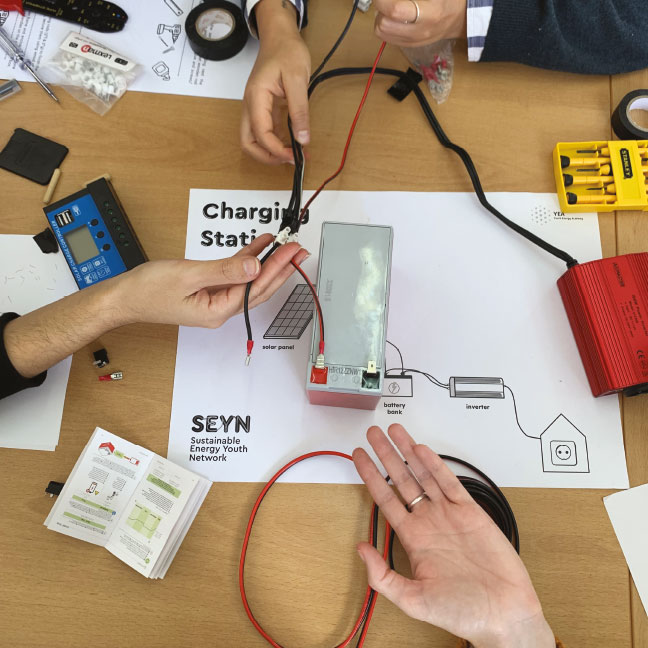
Educate to transform
In a world where the urgency of sustainability becomes increasingly evident, Project TERRA has emerged as an initiative that aims to transform the way we view environmental education in schools.
There’s no doubt that school and education play a crucial role in molding consciences and influencing future behavior. As Nelson Mandela said, “Education is the most powerful weapon which you can use to change the world.” The TERRA Project—Energy Transition for the Recovery of Environmental Resources— is based on this premise, and it recognizes the role of education in building a more aware and responsible society.
In the school garden at Escola Infanta D. Mafalda, Gondomar you can see one of TERRA’s most notable initiatives, the organic and hydroponic cultivation of horticultural and floral species. “This practical experience not only teaches students about the diversity and life cycle of plants, but also highlights the importance of preserving soil and water,” explains Américo Sousa, professor and coordinator of the Department of Exact and Natural Sciences.
Furthermore, the garden allows you to either taste the produce straight from the ground or after it has been prepared in the school canteen. It also “uses water from the school’s well, which features a pumping system for watering the green spaces around the school,” he continues.
The project’s main aim is to contribute to an inclusive and sustainable energy transition through training. It teaches the school community to adopt affordable and efficient energy measures that improve the standard of living, while preserving natural resources and reducing our carbon footprint.
“By thinking globally and acting locally, we want to use the tools at our disposal to achieve Portugal’s goal of decarbonization of the atmosphere and carbon neutrality by 2050,” says Américo Sousa.
The planned installation of solar panels in the garden represents a significant step towards energy selfsufficiency. But this project goes even further on the path to decarbonization when it comes to school transport, as TERRA is determined to reduce dependence on fossil fuels. This is achieved by encouraging more sustainable means of mobility through the short-term provision of electric scooters, promoting the use of public transport, and physical exercise.
The support from the EDP Energia Solidária Program has been crucial to the success of this project. In addition to the necessary financial resources, the program provides essential technical support to ensure that the measures implemented are effective and appropriate to the needs of the educational community.
According to Américo Sousa, this program will provide financial resources for the purchase of equipment that will drive the school’s fair and sustainable energy transition and provide renewable energy solutions for the educational community.
“It’s also worth highlighting the fundamental role of the EDP volunteers within the TERRA project. They provide support by analyzing proposals presented by the companies involved and present ideas and suggestions for further development,” he concludes.
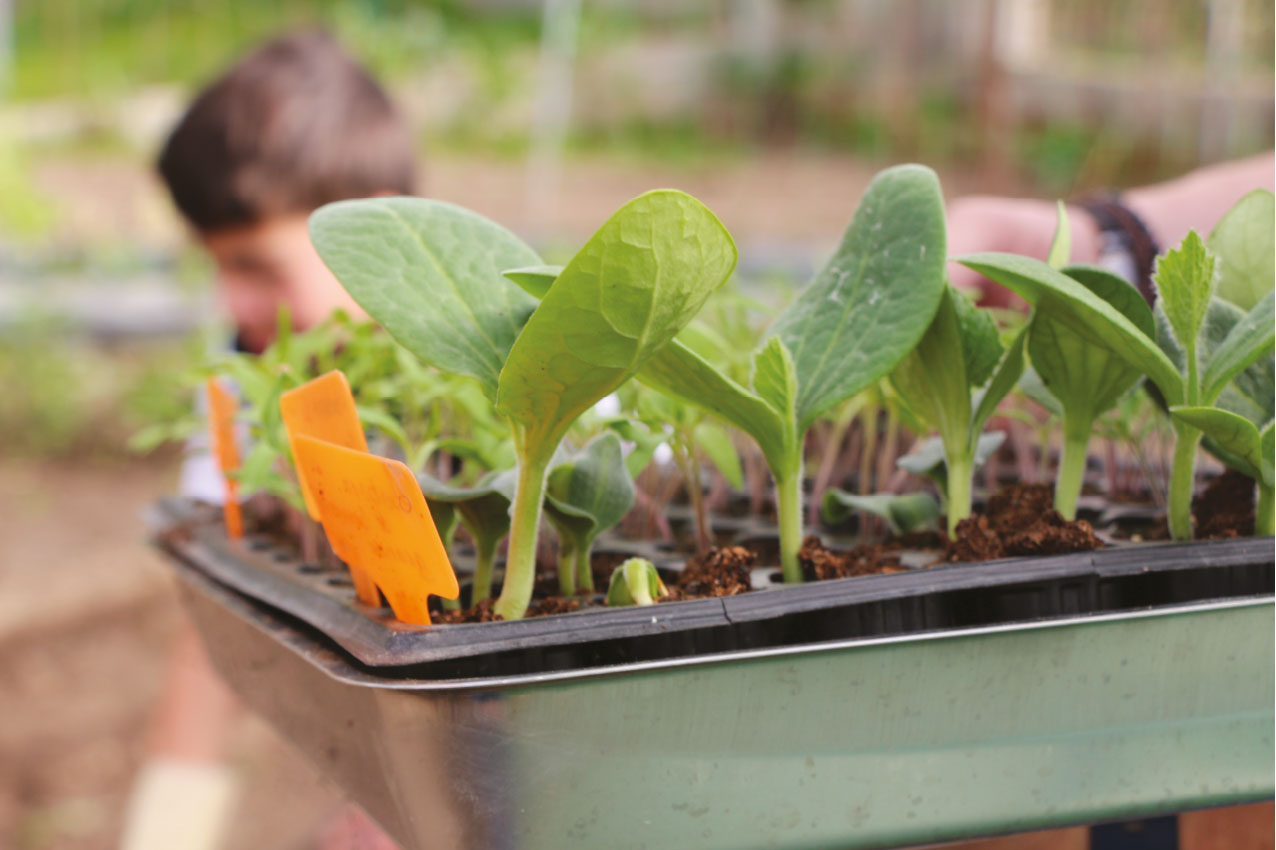
Keeping the countryside alive
One of the main objectives of the “El Pueblo Me Alimenta” project is to support small farmers by creating a network and enabling them to take their products directly to consumers, which in turn has revitalized the rural economy in some of Aragon’s villages.
“The incalculable work of small producers deserves recognition for revitalizing the countryside, and this event gives them the opportunity to make themselves known.”
“Personally, it helped me establish a connection with producers and promote their product in my work as a chef and teacher.”
“The experience was very positive, both during the presentation and then in making contact with suppliers.” “It’s a good idea to carry out this type of activity to get products out to our customers.”
These were some of the reactions of participants in the El Pueblo me Alimenta (”The Countryside Feeds Me”) initiative. It’s one of the projects supported by EDP Energia Solidária, which works for rural development within the agri-food sector in villages in Spain’s Aragon region.
The heart of the initiative focuses on the socioeconomic revitalization of rural territories through the promotion of local consumption. In turn, this creates a change in One of the main objectives of the “El Pueblo Me Alimenta” project is to support small farmers by creating a network and enabling them to take their products directly to consumers, which in turn has revitalized the rural economy in some of Aragon’s villages. “El Pueblo me alimenta” consumer habits, leading to greater sustainability and stimulating the local economy. How? By supporting producers as the key elements in the region’s development and through enhancing its cultural, gastronomic, and social heritage.
Initiatives include direct interactions with consumers, marketing campaigns, a focus on energy efficiency, and the creation of a platform that enables producers within the network to exchange ideas and offer mutual support.
Project mentor Rosa Rived Calvo says the main challenge was “keeping the countryside alive!” “El Pueblo Me Alimenta” also faced the issue of getting local products to consumers in the capital. Half of Aragon’s population is in the capital, where access to locally farmed products has room for improvement.
“Local production systems that raise awareness of the product origin and come direct from the producer, help to take care of the environment and minimize pollution from transport, both of raw materials and the final product,” says Rosa. She adds that energy efficiency and clean energy have also proved challenging.
Rosa tells us EDP’s support also improves knowledge and consumption of locally sourced products among urban customers, reducing costs for agri-food companies. But there is still more work to do.
Local action groups in Aragon continue to work for rural development within the sector. Rosa says they will actively strive to replicate the concept in new spaces among Aragon’s provincial capitals.
“There’s still a lot to do, and there are always ways we can raise awareness of new products and support the profitability of fledgling businesses. We’ll continue to look for innovative processes that complement our day-to-day work in this area.”
Energy efficiency in business
De Molina is an artisanal company with two sisters at the helm, Concha and Antonia, that has embarked on an important journey towards more sustainable forms of production.
“When we were first informed of this program, we didn’t hesitate to participate and improve our energy efficiency. It also helped us to improve our adaptability to periods of greater consumption or production,” says one of the managers of De Molina Artesanas Alimentarias, an artisanal food company from Caspe in Zaragoza.
A non-linear energy consumption pattern has always been the company’s biggest challenge. There are days when consumption peaks, and other times when little or nothing happens. This is because, as an artisanal company, activity depends on the pace of orders coming in at any given moment. “We resolved these peaks using a consumption map to tell us when we need more energy and when to adapt to increased production,” they explain.
Food artisans, they focus on local products, such as turmeric and capers, and also work to innovate with new products. They’re very aware of the importance of sustainability and taking care of the natural environment. In fact, it’s one of the company’s key principles is integrated cultivation of raw materials, which are seasoned and preserved on its farms.
“We realized that we had great potential because of the many hours of sunlight. We felt it would be important for our store to champion sustainability by reducing grid electricity consumption and using self-consumption energy through photovoltaic panels,” they tell us. The project was set up and implemented in around three months.
To begin with, they made several upgrades to localized irrigation systems and introduced the use of biodegradable nets on their crops. This considerably reduced water consumption and improved efficiency. The next step was to reduce electricity use.
“One of our objectives as a company is to grow sustainably by making responsible use of the energy we have at our disposal. We also want to build a better and more sustainable future through a commitment to promoting water and energy efficiency, and encouraging rural development in our area. We would like to see this concept—of being more De Molina Artesanas Alimentarias sustainable and efficient— replicated in other regions. Also, we’re always available to share our experience with other small companies, which helps them to find efficient solutions for their water and electricity consumption.”
One of the things De Molina’s partners insist on is continued training in key areas. For example, the last company training course was on circular economy which helped employees to see how they are already putting this resource into practice without, perhaps, even knowing it. “One of our crops is chili pepper. The market only wants pickled green chilies, and the overripe red chilies were just discarded. At first, they were just left on the ground, like organic fertilizer. But after thinking about it, we decided to utilize them and create a vegetable pâté with extra virgin olive oil and wine vinegar. It’s a far more economical outcome for a product that we previously threw away.” This is now one of the company’s hero products.
“Our company is a very small, family-owned business with just two people at the helm. But we look tirelessly for new products that we can develop from the raw materials we grow.”
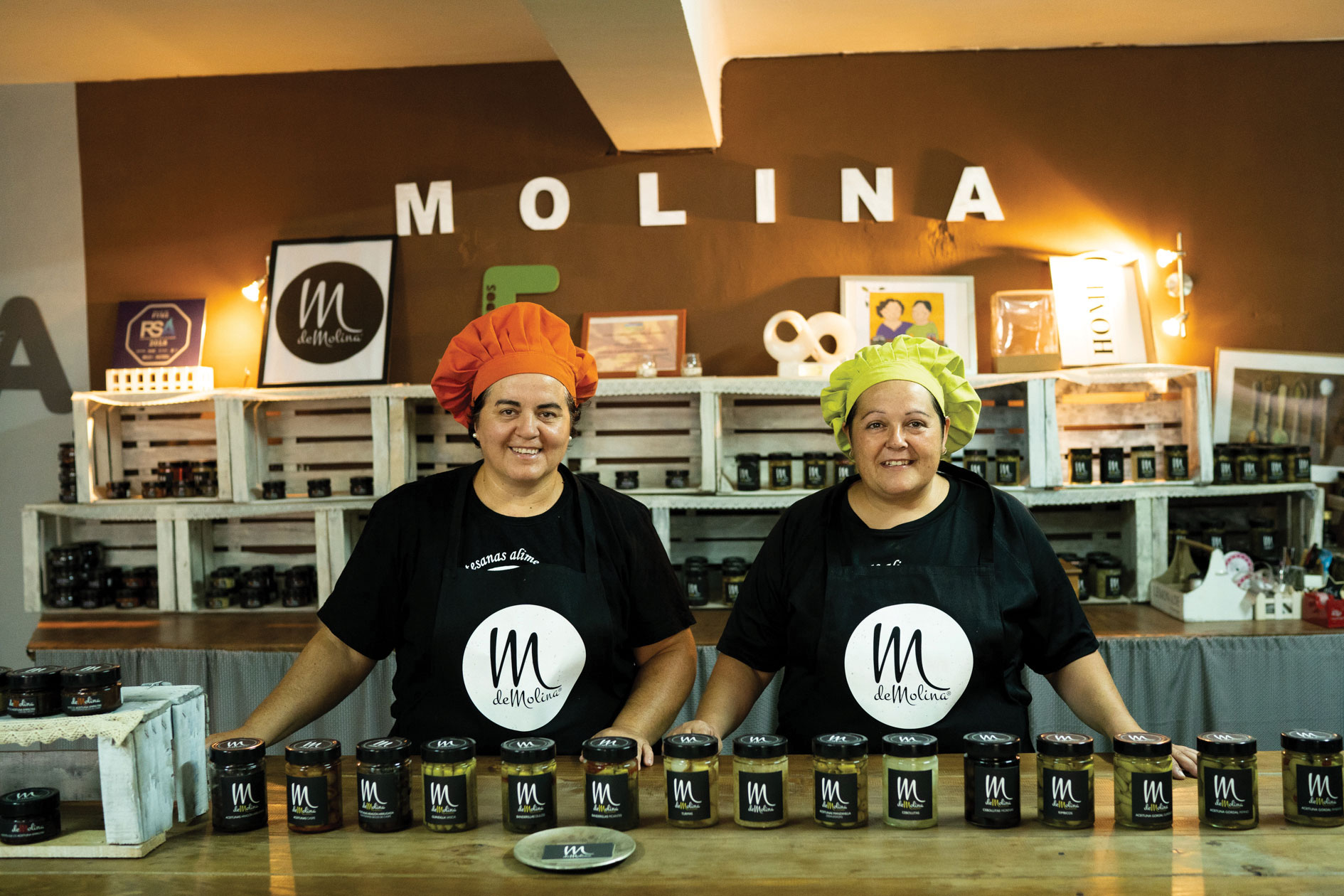
A new path to sustainability
Local energy communities are fast becoming a reality in this paradigm shift towards decentralized energy.
In recent years there has been real growth in self-consumption renewable energy—the production of renewable energy where consumers produce, consume, store, share, and even sell surplus energy. Decentralized energy production is based on renewable sources that aim to improve social and spatial cohesion through energy independence, resource allocation, and job creation in less developed regions of the country.
In this vein, the Local Energy Communities (Comunidades Energéticas Locais—CEL) came into play in Spain. They are much more than groups that simply share energy; they’re also forums for dialogue that encourage participation, collaboration, development of commitments, trust, and a deep sense of belonging. This approach reflects the vision that renewable energy not only powers homes but also forges bonds across communities.
In 2019, Abidanza, a small village in Huesca, became aware of this paradigm shift. Locals started assessing the possibility of installing photovoltaic panels to pump water from the municipal supply network. The aim was to benefit residents and businesses in the area and create considerable savings in energy costs. With the endorsement of the mayor, Javier Labat, local residents came together to create a cooperative, marking the beginning of a common objective to develop sustainable projects.
As Javier Labat tells us, the ultimate objective is to “create lowerconsumption habits, optimize panel production, raise awareness on the decarbonization of energy and reduce emissions.” He points out that “EDP’s program provided the necessary impetus for the creation of CEL, with excellent technical, legal, and administrative advice.”
As one of the first CELs in this community, the idea is to network with other, already-formed CELs in other areas. “We’re also willing to promote and help any others to embark on the path of a CEL,” he says.
But the journey hasn’t been easy. “We knew that many people were interested in the project, but there were also many neighbors who had doubts. But the majority finally decided to join the Cooperative in the buildup to its creation,” says the municipality official. “The acceptance of CEL in the area is very high. This means we have the necessary revenue to continue moving towards a greener and energy-sustainable municipality.”
Originally established in 2023, the focus is now to apply for subsidies in 2024 to carry out the necessary installations. Abidanza is on the right track.
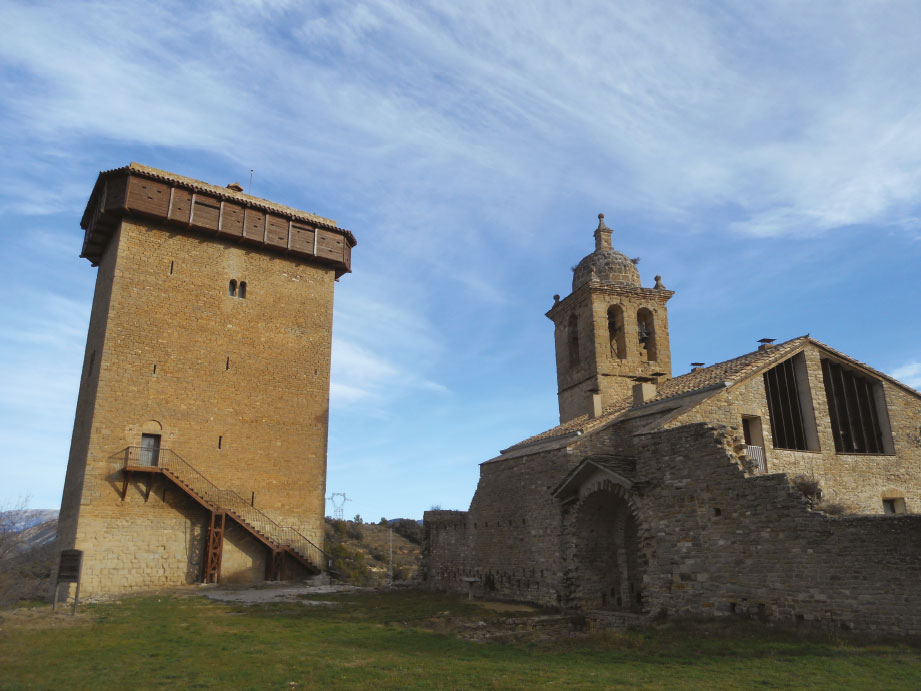
Sustainable schools, resilient communities.
The project “EDP Energia Viva: Integrating the SDGs in Schools” in São Paulo, Brazil, was conceived with the aim of promoting cross-cutting actions that address not only the energy issue but also the social and environmental dimensions, committing to the Sustainable Development Goals (SDGs) in schools where future generations are shaped.
Energia Viva’s mission is to drive social, environmental, and energy transition initiatives at the Ernesto Quissak State School in São Paulo, an EDP concession area, with an emphasis on implementing renewable energy sources and gardens with rainwater reuse. “This project aims for the improvement of the quality of life in these communities, promoting a just energy transition and environmental sustainability,” explains Beatriz Ramos, Analyst of Technological Services at SENAI Institute of Chemical Technology and Environment.
According to Ramos, the inspiration for the project was influenced by the adoption of the SDGs by the international community, including Brazil, as a global agenda for sustainable development by 2030. The urgency to improve the quality of life in vulnerable communities, “such as public schools in Guaratinguetá, motivated the search for solutions that would provide access to clean energy, healthy food, and environmental education,” she indicates.
This project aims not only to reduce social and environmental disparities but also to promote more equitable and sustainable development, rooted in the principles of the SDGs. “One of the fundamental aspects of the project is the provision of workshops and training courses in the field of electrical energy, aiming not only at the implementation of sustainable technologies but also at creating employment opportunities, especially for women at risk, with the objective of promoting a more just and equitable society,” she explains. A project that expects to directly impact 532 people.
According to the project leader, Energia Viva will have an active impact on the local community, promoting not only environmental sustainability but also social, economic, and educational development in an inclusive and equitable manner.
In the local community, by implementing renewable energy sources and sustainable practices in public schools, the project will provide access to clean and sustainable energy. Additionally, the creation of community gardens and the promotion of environmental education will encourage healthier eating habits, increase food security, and promote people’s connection with the environment.
In this way, the project will empower students, teachers, and community members on energy, sustainability, and environmental topics, contributing to the development of skills and knowledge that can be applied within the school and in their daily lives and future careers.
“Community involvement in voluntary activities and social impact projects will also strengthen community ties and promote a sense of belonging and shared responsibility for the well-being of the local environment.”
To achieve these objectives, the project relies on the partnership of SENAI São Paulo, the National Service for Industrial Learning, and possible alliances with NGOs, in addition to the support of the EDP Energia Solidária program. “The idea of the project is that we can develop it in other schools in São Paulo in the future, under the EDP concession area,” concludes Beatriz Ramos.
